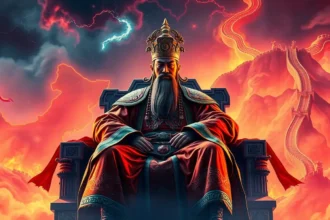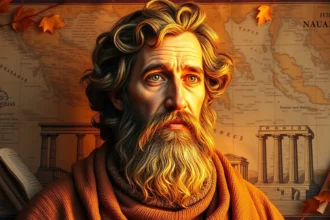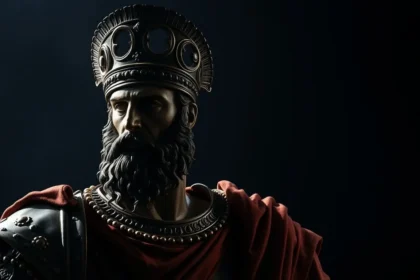Fyodor Mikhailovich Dostoevsky (1821–1881) is a literary giant, revered for his profound exploration of human psychology, morality, and spirituality. His works delve into the darkest corners of the human experience while grappling with questions of faith, redemption, and existential meaning. In this blog, we explore Dostoevsky’s turbulent life and highlight his greatest masterpieces.
What is hell? I maintain that it is the suffering of being unable to love.
Fyodor Dostoevsky
A Life of Turmoil and Inspiration
Born into a middle-class family in Moscow, Dostoevsky’s early life was shaped by personal tragedy. After losing his mother at 15 and his father shortly thereafter, he enrolled in the Nikolayev Military Engineering Institute, later abandoning his brief engineering career to pursue writing. His debut novel, Poor Folk (1846), earned him critical acclaim and established him as a rising star in Russian literature.

In 1849, Dostoevsky’s life took a dramatic turn when he was arrested for participating in the Petrashevsky Circle, a group of intellectuals discussing banned ideas. Sentenced to death, he was spared at the last moment and instead sent to a Siberian labor camp. This harrowing experience deeply influenced his worldview, reinforcing themes of suffering, redemption, and the resilience of faith that would permeate his later works.
Dostoevsky’s Greatest Works
1. Crime and Punishment (1866)
A masterpiece of psychological fiction, this novel follows Rodion Raskolnikov, a struggling student who murders a pawnbroker under the belief that extraordinary individuals are above moral law. Consumed by guilt, Raskolnikov embarks on a harrowing journey of self-reckoning and redemption. Dostoevsky explores morality, justice, and the human conscience, creating one of the most enduring works in world literature.
2. The Brothers Karamazov (1880)
Often considered Dostoevsky’s magnum opus, this philosophical epic centers on the Karamazov family: the debauched patriarch Fyodor and his three sons—Dmitri, Ivan, and Alyosha—each embodying contrasting facets of human nature. When Fyodor is murdered, the story evolves into a profound exploration of faith, free will, and the existence of evil. The novel’s theological and moral inquiries have left an indelible mark on literature and philosophy.
3. Notes from Underground (1864)
This novella is a precursor to existentialism, presenting a bitter, self-isolated narrator, the Underground Man. Through his cynical monologue, Dostoevsky critiques society and human nature while probing the contradictions of free will and individuality. Notes from Underground challenges readers to confront uncomfortable truths about themselves and the world.
4. The Idiot (1869)
This tragic tale follows Prince Lev Myshkin, a Christ-like figure of innocence and kindness, who is scorned as a fool in a morally bankrupt society. Returning to Russia after treatment for epilepsy in Switzerland, Myshkin becomes entangled in a web of betrayal, love, and greed. Dostoevsky critiques the materialism and corruption of 19th-century Russia while exploring what happens when purity confronts a cynical world.
5. Demons (1872)
Also known as The Possessed, this political novel critiques nihilism and radical ideologies. Set in a provincial Russian town, it portrays a group of revolutionaries whose extremist ideals lead to chaos and destruction. Inspired by real events, Demons is both a satire of radicalism and a prophetic warning about the dangers of abandoning spiritual values.
Why Dostoevsky Matters
Dostoevsky’s works resonate because they address timeless and universal questions: What drives human behavior? How do we reconcile faith and doubt? What is the nature of good and evil? His characters, rich with psychological depth, wrestle with these questions, reflecting the complexities of human nature.

His influence extends far beyond literature. Writers like Kafka, Camus, and Woolf have drawn inspiration from Dostoevsky’s storytelling, and his exploration of the human psyche anticipated many of the insights of modern psychology.
Dostoevsky’s Enduring Legacy
Dostoevsky’s novels are more than stories; they are profound investigations into the soul, offering readers a lens through which to examine their own lives. His ability to blend psychological insight, philosophical depth, and spiritual themes ensures his works remain as relevant today as they were in the 19th century.
The soul is healed by being with children.
Fyodor Dostoevsky
Whether you’re drawn to the existential musings of Notes from Underground, the moral dilemmas of Crime and Punishment, or the theological debates of The Brothers Karamazov, Dostoevsky offers a literary journey that is both challenging and transformative. If you haven’t yet explored his world, now is the perfect time to dive into the works of this unparalleled genius.
Additional Resources
Certainly! Below are additional curated and hyperlinked resources to complement the blog on Fyodor Dostoevsky and his works:
Books and Biographies
- Dostoevsky: A Writer in His Time by Joseph Frank
A comprehensive biography offering unparalleled insight into Dostoevsky’s life and literary achievements. - Fyodor Dostoevsky: His Life and Work by Konstantin Mochulsky
A classic study of Dostoevsky’s life, interweaving his personal struggles with his literary creations.
Online Articles and Analysis
- Fyodor Dostoevsky: The Genius of Suffering – The Guardian
An article discussing how Dostoevsky’s personal hardships shaped his philosophical and literary explorations. - Dostoevsky and the Question of Free Will – The Atlantic
A deep dive into Dostoevsky’s exploration of free will, morality, and human agency in his works. - The Enduring Appeal of Dostoevsky – The New Yorker
An analysis of why Dostoevsky’s works remain relevant in contemporary times.
Documentaries and Videos
- Dostoevsky: A Writer’s Life – YouTube
A detailed documentary exploring Dostoevsky’s life and his most famous novels. - Great Authors: Fyodor Dostoevsky – PBS
A PBS special highlighting Dostoevsky’s influence on literature and philosophy. - The Psychology of Dostoevsky’s Characters – TEDx
An engaging talk about the psychological depth of Dostoevsky’s characters.
Academic Articles and Journals
- Dostoevsky and Modern Psychology – JSTOR
Academic papers exploring Dostoevsky’s insights into human behavior and their relevance to psychology. - Faith and Doubt in Dostoevsky’s The Brothers Karamazov – Project Muse
A scholarly article analyzing the theological themes in one of Dostoevsky’s most profound works. - The Philosophy of Suffering in Dostoevsky – Taylor & Francis
Research discussing Dostoevsky’s philosophical treatment of suffering and redemption.
Ethics and Literature Resources
- The Ethics of Dostoevsky’s Characters – Stanford Encyclopedia of Philosophy
An exploration of the ethical and moral dilemmas presented in Dostoevsky’s works. - World Literature Today: Dostoevsky’s Influence
Articles on Dostoevsky’s global impact on literature and philosophy.
Interactive Resources
- Interactive Timeline of Dostoevsky’s Life – Biography.com
Explore the key events in Dostoevsky’s life and career through an engaging timeline. - Dostoevsky’s World: Maps and Locations – RussianLife.com
An interactive guide to the settings and locations featured in Dostoevsky’s novels. - Thematic Analysis of Dostoevsky’s Works – CliffsNotes
An interactive tool for exploring the major themes and characters in Dostoevsky’s works.
These resources provide a solid foundation for deepening your understanding of Dostoevsky’s life, works, and enduring legacy. Let me know if you’d like more tailored recommendations!
Must Read : The Tragic Dilemma of Kevin Carter












